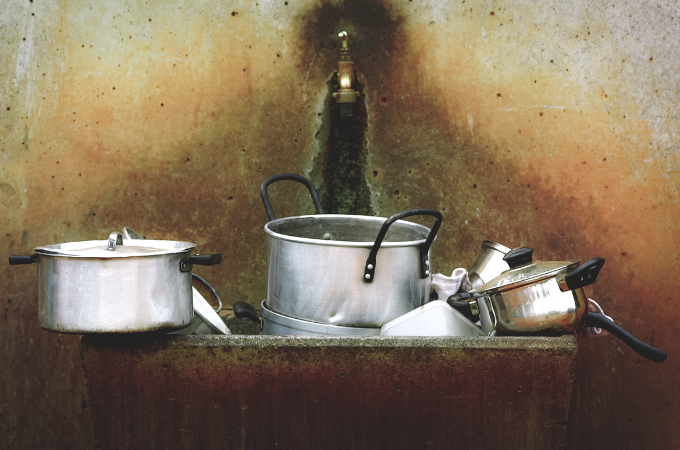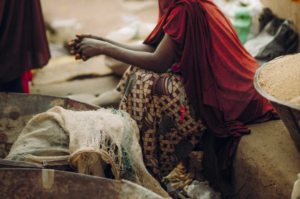
Maman Janine came to the house every Thursday like clockwork after passing by the zando. She told her husband that the shopping took all afternoon but, in reality, her usuals pre-prepare her bags. It was a speedy pick-and-go system that took her under an hour. The rest of the afternoon she spent with Jaqui on the veranda, ranting about their husbands and kids, about how they should have left them years ago. They comment on the church attendees, and who they believed would appear in 3 days’ time. Expensive liquids pass from big containers with little openings to small containers with big openings. This was where they let loose and allowed themselves to be heathens.
This week was different. Janine came on Monday and hasn’t left since. It’s now Thursday but discussions about Sunday aren’t on the agenda. Jaqui’s world is ending. Her husband left her, it finally happened. Her deepest wish has materialized but she sits like a hollow shell in their big house asking herself what’s next. And Janine is around. Around to be around. Janine’s daily responsibilities are not undone. Janine cooks, irons and does laundry from her best friend’s home, and the chauffeur shuttles everything back to her husband and kids. For Janine, there is no other place to be. To be in the presence of her friend is her commitment, because presence says more than any words spoken, food cooked, space given. Her presence is a love song.
Listen.
The house is empty, Jaqui’s partner is gone and has taken the children. She is demonized by her in-laws, and her direct family is disappointed. Society looks at her from the corner of rolled eyes because she had it all, mobali munene, but didn’t do enough to keep him. It becomes quiet, deafening. All but for the sound of kitchen utensils belling high notes. And smells of food, she is not hungry for, invading her nostrils and inducing appetite. And if appetite is not around, then someone to make sure she is eating enough and well. What could have been a murderous empty space is now filled. Yes, Jaqui could lie in bed on the road to rock bottom, but whenever she decides to reach up for help, she knows that there is someone to grab it, and that they are not far. There is stability in that.
That’s the earliest memory Benedict had of her mother. Motema pasi, heartbroken, or as she has come to know the feeling, depressed. Her mother was never alone though, she was constantly with a strange woman, always present and around. Tantine Janine. A Tantine that she knows by name. Knows exactly what drink she likes. How to keep secret her smoking habits, and which foods to pick at a wedding when asked to make her a plate. But other than that, she knew nothing of the woman’s real life. Except that being away from her own home for so long created problems for Tantine Janine so, before long, she took her children and moved into the annex at the back of Jaqui’s house. Patrick and Eunice, the children of Tantine, were her best friends growing up.
They all lost touch when Benedict went abroad with her father. They barely recognise each other now. Benedict barely recognises anything. Except for a love song.
Benedict is back home because her maternal grandfather passed. Once she moved away with her father, Maman Jaqui had to move out of the house and Papi was her refuge. Now once again, Jaqui finds herself in an empty house, feeling empty inside. The site is all the opposite though. The house has never been so full. People sleeping on floors, cooking, eating, laughing, talking. Maman Jaqui is not crying, she is tired. But she is well surrounded. Benedict stays close to her mother the whole time. Aunties and uncles talk to her about memories of her childhood. Most of which have faded like her Lingala, but apparently, they have known her since she was little.
Without indiscretion, one after the other talked about Papi. Sharing stories, mocking his mannerisms, speaking of his accomplishments. Then they cry, together, grown men with the house helps, Mamans with their sisters. For 40 days, the house remains full. For 40 days people come in and out. Kids do homework where they can find space. Businessmen take calls in silent corners. Tantines handle their hustles while cooking and welcoming guests. 40 days of collective healing, 40 days of vulnerability, 40 days of village, 40 days of love songs.
Benedict’s phone, or rather her partner abroad, disrupts her thoughts.
Hey, just heard you went to Congo! We’re on a break but you could have let me know, I’m worried about you. Everything okay? I’m also texting ’cause I finally read your letter. I have to be honest, I really don’t understand how we got here. I love you, I say it all the time, I don’t know how else to make you understand that I do.
Benedict looks up from her phone, and a full plate of food is being shoved into her hands. Makemba and ntaba that could fill your stomach with just the smell. Plates are going all around. The young boys are shuffling around with crates, one boy per handle, two per crate. They are serving drinks and collecting empty bottles. At a far she sees her mom laughing in nostalgia. Next to her is Tantine Janine with tears calmly streaming down her face. Janine prepares a water bottle to wash her hands. Instinctively Benedict stands to pour the water for Tantine. They look at each other with heart-filled and heavy smiles. Benedict’s eyes become heavy, her vision becomes blurry. They regain their seats and eat side by side in a hollowed silence. Around them utensils crash against plates, laughs and conversation rise and fall like gusts of wind. Like partitions for an orchestra. Like a familiar love song.
Lexicon:
Maman – madam
Tantine – Aunty
Matanga – mourning / grief
Zando – market
Mobali munene – A great husband
Motema pasi – heart broken
Makemba – plantain
Ntaba – goat
Photo by Scott Umstattd on Unsplash










COMMENTS -
Reader Interactions